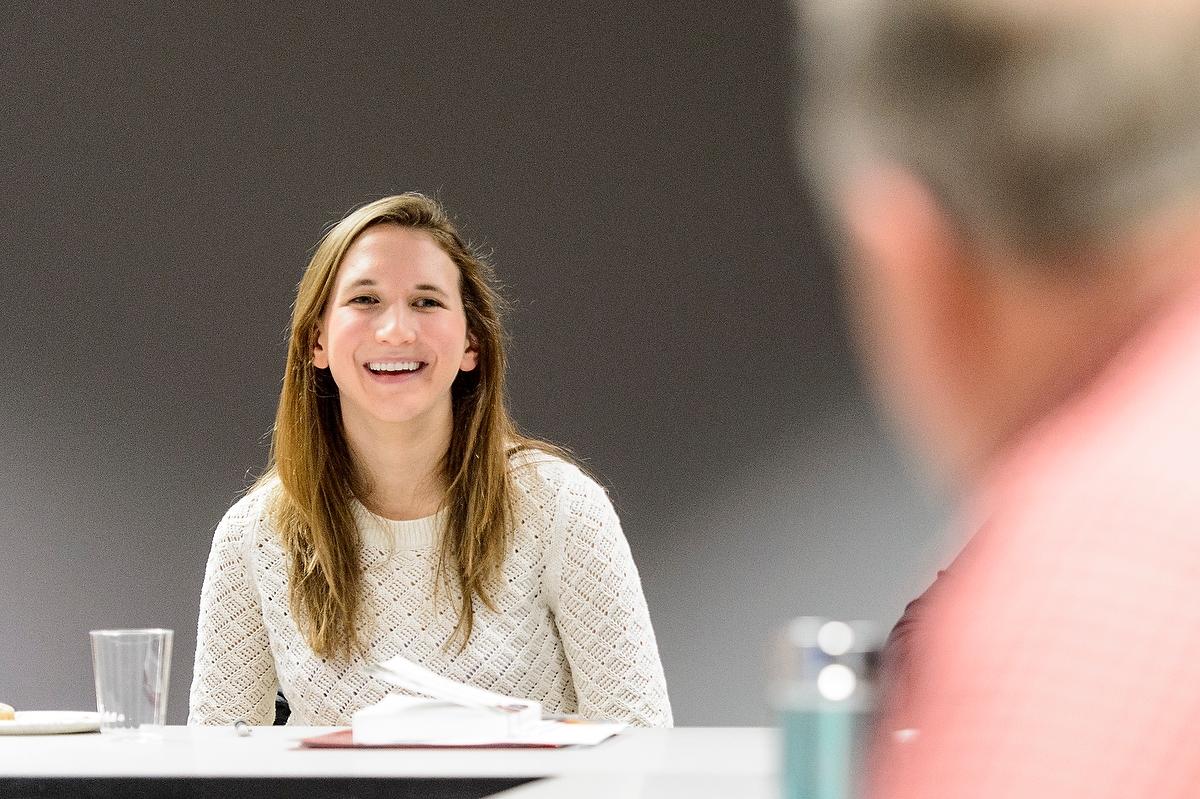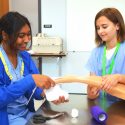NEH grant to create program linking business, humanities

Under the grant, business students will have the opportunity to participate in a public humanities exchange, HEX-U, which supports programs such as a Warrior Book Club led by graduate student Molly Harris, which brings together veterans and non-veterans. Photo: Bryce Richter
A joint project at the University of Wisconsin–Madison aimed at promoting connections between the humanities and students in other academic fields has been awarded a $100,000 grant as part of a new National Endowment for the Humanities (NEH) program.
The innovative project, called “Risk and Reward: Navigating Uncertainty Through Humanities – Business Connections,” will help Wisconsin undergraduate business students draw insights from history, literature, and philosophy as they navigate their business curriculum. It is a partnership between the Wisconsin School of Business and the College of Letters & Science. The grant will support the creation of a series of new courses, a public lecture series on “Foreseeing the Future,” and project-based learning opportunities involving interdisciplinary teams of students helping a community organization or company.
“This grant provides an opportunity to foster new connections between business and the humanities, giving Wisconsin BBA students a chance to develop a broader perspective on risk that will help them become better decision-makers and leaders,” says Suzanne Dove, assistant dean for academic innovations at the Wisconsin School of Business and a co-director of the project. “We want our students to see that the liberal arts requirements they fulfill are a critical component of their business degree and that the Wisconsin BBA is a stronger degree because it integrates those requirements.”
“With this NEH grant, we will be able to bring two sides of campus into an ongoing conversation and collaboration around a topic that has a pressing relevance for all of us,” adds Emily Clark, associate director of the Center for the Humanities at UW–Madison and co-director of the project.
The NEH funds will be used to establish a linked set of three humanities courses for freshmen and sophomores around the theme “Navigating Uncertainty.” Intended to be of interest to both business and humanities students, the courses focus on social movements (Histories of Uncertainty, Professor Jennifer Ratner-Rosenhagen, History), financial risk and return (American Dreamers, Professor David Zimmerman, English), and business ethics (Doubt, Professor Karl Shoemaker, Legal Studies).
For the first time, Wisconsin BBA students will also be able to take part in the Center for the Humanities undergraduate public humanities exchange, HEX-U. Teams of business and humanities students will work together in support of a community partner or company to tackle a major problem and develop a project to create solutions.
The funding will also enable the launch of the “Foreseeing the Future” speaker series. A committee of business and humanities faculty will invite a visiting scholar to campus each year, to present a public lecture, lead a seminar or book discussion, and help lay the groundwork for a sustainable partnership between different groups of faculty on campus.
“We hope this landmark program will be a model for connecting humanities with professional schools, while opening business students to new perspectives that will help them make sense of the world and be more effective, ethical leaders,” adds Joann Peck, associate dean of the Wisconsin undergraduate business program at the Wisconsin School of Business.
Subscribe to Wisconsin Ideas
Want more stories of the Wisconsin Idea in action? Sign-up for our monthly e-newsletter highlighting how Badgers are taking their education and research beyond the boundaries of the classroom to improve lives.



